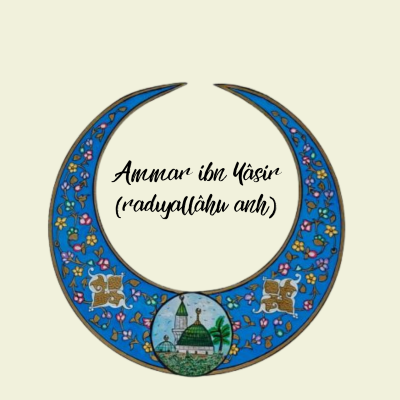He was among the earliest Companions, one of the first to follow the Messenger of God, peace and blessings be upon him, enduring the harsh tortures sip by sip.
The Honorable Ammar, may God be pleased with him, the son of a mother who displayed unprecedented courage against the horrific tortures she faced, the Honorable Sumayyah, may God be pleased with her, the first female martyr of Islam, was once forced to say what the polytheists wanted under the effect of torture. The thought of his faith being in danger caused him more anguish than the torture itself, and he wept bitterly when he met with the Messenger of God, peace and blessings be upon him. When the Prophet asked him, “How do you find your heart?” he replied, “Content with faith.” Upon this, the Prophet said, “If they do the same things to you again, say those words again!”[1]
The Messenger of God, peace and blessings be upon him, said about him, “He is filled with faith from head to toe.”[2]
Following a dispute between the Honorable Khalid ibn al-Walid, may God be pleased with him, and Ammar ibn Yasir, may God be pleased with him, the Messenger of God declared, “Whoever is an enemy to Ammar, is an enemy to God.”[3] Upon this, Khalid immediately apologized to Ammar.
Ammar, the son of Yasir from Yemen, participated in battles alongside the Messenger of God and continued to join campaigns after the Prophet’s departure to the Hereafter.
When the Honorable Umar appointed him as the governor of Kufa, it is narrated that this responsibility increased his asceticism and piety. He did not turn the office of governorship into a display of pomp and splendor, nor did he use it as a show of power against the people. He would personally go to the market for his food, carry it himself, and felt no need for an assistant. During his governorship, when someone called out to him as “O, one with the cut ear,” despite having the power, he chose not to punish the speaker, merely saying, “I lost it in the path of God.”[4]
At the deathbed of Hudhayfah ibn al-Yaman, one of the prominent Companions, when those present asked, “Whom do you advise us to turn to when the believers are in disagreement?” He pointed to Ammar and said, “Be with the son of Sumayyah.”[5]
“He participated in the migration to Medina. There, it was Ammar who first suggested the idea of building a mosque, an idea that our beloved Prophet had not yet mentioned to the Companions. During the construction of the mosque, he exerted great effort, carrying bricks two at a time, chanting, ‘We, the Muslims, build mosques.’ Seeing this, the Messenger of God exclaimed, ‘Alas, the son of Sumayyah will be killed by a rebellious group.’[6]”[7]
At the age of 91, Ammar participated in the Battle of Siffin, fighting against the forces of Muawiya. Some of the enemy soldiers, recalling the words of the Prophet, were wary of becoming the “rebellious group” and thus avoided confronting Ammar, yet the battle continued, and he was martyred. The identity of the group foretold by the Messenger of God during the construction of Masjid al-Nabawi was revealed in this battle.[8]
The Companions tried to find solace in remembering what the Messenger of God, peace and blessings be upon him, had said about Ammar to cope with the sadness of his departure: “Paradise longs for three people: Ali, Ammar, and Salman.”[9]
Ammar left this world fulfilling his duty in the path of God, worthy of the Paradise that longed for him.
According to Ibn Abbas, may God be pleased with him, the following verse was revealed about Ammar ibn Yasir:[10] “Is he who worships God devoutly in the watches of the night, prostrating and standing, who fears the Hereafter and hopes for the mercy of his Lord (to be likened to that other)?” (Az-Zumar, 39:9).
[1] Ibn Sa’d, Tabaqat, III, 285.
[2] Abu Umar Jamaluddin Yusuf b. Abdillah b. Muhammad b. Abdilbarr an-Namari, Al-Istisab fi Ma’rifati’l-Ashab, Beirut: Daru’l-Jil, 1412/1991, p. 1034.
[3] Ahmad ibn Hanbal, IV, 89, 90.
[4] Ibn Sa’d, Tabaqat, III, 290.
[5] Halid Muhammed Halid, Yeryüzü Yıldızları: 60 Seçkin Sahabe Hayatı, “Ammar bin Yâsir: Cennetten Bir Adam”, 2003, Istanbul: Beka Yayınları, pp. 153–166.
[6] Ibn Sa’d, Tabaqât, III, 252.
[7] Zühdü Mercan, “İki Şehidin Oğlu Hz. Ammar b. Yasir”, Yeni Ümit, Sayı: 48, Nisan-Mayıs-Haziran 2000.
[8] Ibid.
[9] Tirmidhi, Manaqib 34/3797.
[10] Mercan, ibid.




